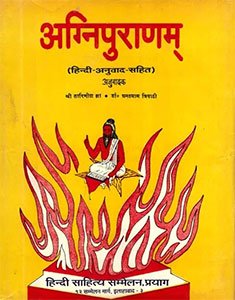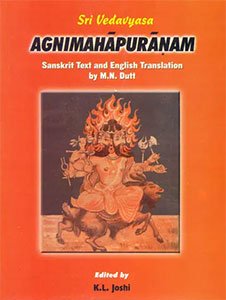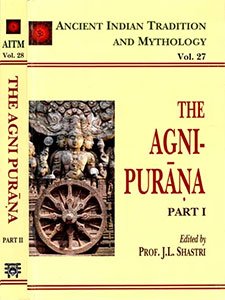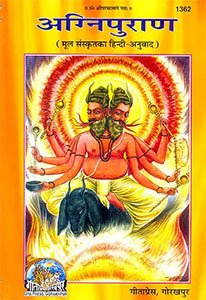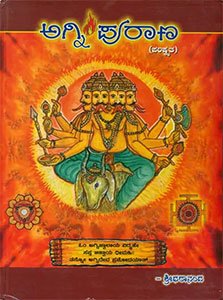Agni Purana [sanskrit]
97,288 words
This Sanskrit edition of the Agnipurana. It is one of the traditional eighteen Mahapuranas presented as an encyclopedia of ancient Indian history and knowledge. It contains either 382 or 383 chapters and over 10.000 verses (Sanskrit Shlokas).
Verse 121.52
ओं धनदाय सर्वधनेशाय देहि मे धनं स्वाहा ।
ओं नवे वर्षे इलादेवि लोकसंवर्धनि कामरूपिणि देहि मे धनं स्वाहा ।
पत्रस्थं लिखितं धान्यराशिस्थं धान्यवर्धनं ।
त्रिपूर्वासु विशाखायां धनिष्ठावारुणेऽपि च ॥ ५२ ॥
oṃ dhanadāya sarvadhaneśāya dehi me dhanaṃ svāhā |
oṃ nave varṣe ilādevi lokasaṃvardhani kāmarūpiṇi dehi me dhanaṃ svāhā |
patrasthaṃ likhitaṃ dhānyarāśisthaṃ dhānyavardhanaṃ |
tripūrvāsu viśākhāyāṃ dhaniṣṭhāvāruṇe'pi ca || 52 ||
The Sanskrit text of Verse 121.52 is contained in the book The Agni Puranam (Anandashram Edition) by Shri Chimna Apate (श्री चिमणा आपटे). This book is available online or you could buy the latest edition:
Read online Buy now! The Sanskrit text by Shri Chimna Apate (श्री चिमणा आपटे) (1987)
Glossary of Sanskrit terms
Note: This extracts Sanskrit terms and links to English definitions from the glossary, based on an experimental segmentation of verse (121.52). Some terms could be superfluous while some might not be mentioned. Click on the word to show English definitions.
Dhanada, Sarvadhana, Isha, Dehi, Dehin, Asmad, Dhana, Svaha, Nava, Varsha, Iladevi, Loka, Vardhani, Kamarupini, Kamarupin, Kamarupi, Patra, Tha, Likhita, Dhanyarashi, Stha, Dhanyavardhana, Tripur, Vasu, Vishakha, Dhanishtha, Aruna, Aruni, Aru, Api,
Analysis of Sanskrit grammar
Note: this is an experimental feature and only shows the first possible analysis of the Sanskrit text (Verse 121.52). If the system was successful in segmenting the sentence, you will see of which words it is made up of, generally consisting of Nouns, Pronouns, Verbs, Participles and Indeclinables. Click on the link to show all possible derivations of the word.
- Line 1: “oṃ dhanadāya sarvadhaneśāya dehi me dhanaṃ svāhā ”
- Cannot analyse om*dh
- dhanadāya -
-
dhanada (noun, masculine)[dative single]dhanada (noun, neuter)[dative single]
- sarvadhane -
-
sarvadhana (noun, neuter)[compound], [nominative dual], [vocative single], [vocative dual], [accusative dual], [locative single]
- īśāya -
-
īśa (noun, masculine)[dative single]īśa (noun, neuter)[dative single]
- dehi -
-
dehī (noun, feminine)[adverb], [vocative single]dehin (noun, masculine)[compound], [adverb]dehin (noun, neuter)[compound], [adverb], [nominative single], [vocative single], [accusative single]√dā (verb class 3)[imperative active second single]
- me -
-
ma (noun, masculine)[locative single]ma (noun, neuter)[nominative dual], [vocative dual], [accusative dual], [locative single]mā (noun, feminine)[nominative dual], [vocative single], [vocative dual], [accusative dual]asmad (pronoun, none)[dative single], [genitive single]
- dhanam -
-
dhana (noun, masculine)[adverb], [accusative single]dhana (noun, neuter)[adverb], [nominative single], [accusative single]
- svāhā -
-
svāhā (indeclinable)[indeclinable]svāhā (noun, feminine)[nominative single]
- Line 2: “oṃ nave varṣe ilādevi lokasaṃvardhani kāmarūpiṇi dehi me dhanaṃ svāhā ”
- Cannot analyse om*na
- nave -
-
nava (noun, masculine)[locative single]nava (noun, neuter)[nominative dual], [vocative dual], [accusative dual], [locative single]navā (noun, feminine)[nominative dual], [vocative single], [vocative dual], [accusative dual]nu (noun, masculine)[dative single]√nu (verb class 1)[present middle first single]
- varṣe -
-
varṣa (noun, masculine)[compound], [vocative single], [locative single]varṣa (noun, neuter)[compound], [nominative dual], [vocative single], [vocative dual], [accusative dual], [locative single]varṣā (noun, feminine)[nominative single], [nominative dual], [vocative single], [vocative dual], [accusative dual]√vṛṣ (verb class 1)[imperative active second single]
- ilādevi -
-
ilādevī (noun, masculine)[adverb], [vocative single]ilādevī (noun, feminine)[compound], [adverb], [vocative single]ilādevī (noun, neuter)[compound], [adverb], [nominative single], [vocative single], [accusative single]
- loka -
-
loka (noun, masculine)[compound], [vocative single]
- saṃ -
-
sa (noun, neuter)[adverb], [nominative single], [accusative single]
- vardhani -
-
vardhanī (noun, feminine)[adverb], [vocative single]
- kāmarūpiṇi -
-
kāmarūpiṇī (noun, feminine)[adverb], [vocative single]kāmarūpin (noun, masculine)[locative single]kāmarūpin (noun, neuter)[locative single]kāmarūpī (noun, neuter)[locative single]
- dehi -
-
dehī (noun, feminine)[adverb], [vocative single]dehin (noun, masculine)[compound], [adverb]dehin (noun, neuter)[compound], [adverb], [nominative single], [vocative single], [accusative single]√dā (verb class 3)[imperative active second single]
- me -
-
ma (noun, masculine)[locative single]ma (noun, neuter)[nominative dual], [vocative dual], [accusative dual], [locative single]mā (noun, feminine)[nominative dual], [vocative single], [vocative dual], [accusative dual]asmad (pronoun, none)[dative single], [genitive single]
- dhanam -
-
dhana (noun, masculine)[adverb], [accusative single]dhana (noun, neuter)[adverb], [nominative single], [accusative single]
- svāhā -
-
svāhā (indeclinable)[indeclinable]svāhā (noun, feminine)[nominative single]
- Line 3: “patrasthaṃ likhitaṃ dhānyarāśisthaṃ dhānyavardhanaṃ ”
- patras -
-
patra (noun, masculine)[nominative single]
- tham -
-
tha (noun, masculine)[adverb], [accusative single]tha (noun, neuter)[adverb], [nominative single], [accusative single]
- likhitam -
-
likhita (noun, masculine)[adverb], [accusative single]likhita (noun, neuter)[adverb], [nominative single], [accusative single]likhitā (noun, feminine)[adverb]√likh -> likhita (participle, masculine)[accusative single from √likh class 6 verb]√likh -> likhita (participle, neuter)[nominative single from √likh class 6 verb], [accusative single from √likh class 6 verb]
- dhānyarāśi -
-
dhānyarāśī (noun, masculine)[adverb]dhānyarāśī (noun, feminine)[compound], [adverb], [vocative single]dhānyarāśī (noun, neuter)[compound], [adverb], [nominative single], [vocative single], [accusative single]
- stham -
-
stha (noun, masculine)[adverb], [accusative single]stha (noun, neuter)[adverb], [nominative single], [accusative single]sthā (noun, feminine)[adverb]sthā (noun, masculine)[adverb]
- dhānyavardhanam -
-
dhānyavardhana (noun, neuter)[adverb], [nominative single], [accusative single]
- Line 4: “tripūrvāsu viśākhāyāṃ dhaniṣṭhāvāruṇe'pi ca ”
- tripūr -
-
tripur (noun, feminine)[compound], [nominative single], [vocative single]
- vāsu -
-
vāsu (noun, masculine)[compound], [adverb]vāsū (noun, feminine)[adverb], [vocative single]vā (noun, feminine)[locative plural]
- viśākhāyām -
-
viśākhā (noun, feminine)[locative single]
- dhaniṣṭhāvā -
-
dhaniṣṭha (noun, masculine)[nominative dual], [vocative dual], [accusative dual]
- āruṇe' -
-
āruṇa (noun, masculine)[locative single]āruṇa (noun, neuter)[nominative dual], [vocative dual], [accusative dual], [locative single]āruṇi (noun, masculine)[vocative single]ārū (noun, neuter)[dative single]
- api -
-
api (indeclinable preposition)[indeclinable preposition]ap (noun, neuter)[locative single]
- ca -
-
ca (indeclinable conjunction)[indeclinable conjunction]ca (noun, masculine)[compound], [vocative single]ca (noun, neuter)[compound], [vocative single]
Other editions:
Also see the following editions of the Sanskrit text or (alternative) English translations of the Verse 121.52
Agni Purana with Hindi Translation
by Tarinish Jha and Dr. Ghanshayam Tripathi (तारिणीश् झा और डॉ. घनश्याम त्रिपाठी) (2007)
Publisher: Hindi Sahitya Sammelan, Allahabad; 1199 pages; Title: अग्निपुराणम् (संस्कृत एवं हिन्दी अनुवाद);
Buy now!
Agni Purana (Two Volumes)
by M. N. Dutt (2023)
Publisher: Parimal Publication Pvt. Ltd.; Editor: K. L. Joshi.; ISBN-10: 8171101690; ISBN-13: 9788171101696; 1070 pages.
Buy now!
Agni-Purana (Set of 4 Volumes)
by N. Gangadharan (2006)
Publisher: Motilal Banarsidass Publishers Pvt. Ltd.; ISBN: Part I 8120803590 (9788120803596); Part II 8120803604 (9788120803602); Part III 8120801741 (9788120801745); Part IV 812080306X (9788120803060); 1271 pages.
Buy now!
The Agni Purana (Hindi)
by (2013)
Publisher: Gita Press, Gorakhpur; Title: अग्निपुराण (केवल हिन्दी अनुवाद); ISBN-10: 8129302934; ISBN-13: 9788129302939; 848 pages.
Buy now!
Agni Purana (Kannada)
by Sreedharananda (2013)
Publisher: Pooja Pusthaka Bhandara, Bangalore; Title: ಅಗ್ನಿ ಪುರಾಣ; 560 pages.
Buy now!Preview of verse 121.52 in Kannada sript:
ಓಂ ಧನದಾಯ ಸರ್ವಧನೇಶಾಯ ದೇಹಿ ಮೇ ಧನಂ ಸ್ವಾಹಾ ।
ಓಂ ನವೇ ವರ್ಷೇ ಇಲಾದೇವಿ ಲೋಕಸಂವರ್ಧನಿ ಕಾಮರೂಪಿಣಿ ದೇಹಿ ಮೇ ಧನಂ ಸ್ವಾಹಾ ।
ಪತ್ರಸ್ಥಂ ಲಿಖಿತಂ ಧಾನ್ಯರಾಶಿಸ್ಥಂ ಧಾನ್ಯವರ್ಧನಂ ।
ತ್ರಿಪೂರ್ವಾಸು ವಿಶಾಖಾಯಾಂ ಧನಿಷ್ಠಾವಾರುಣೇಽಪಿ ಚ ॥ ೫೨ ॥
![Agni Purana [sanskrit] - book cover](/uploads/a/Agni-Purana-Sanskrit.jpg)
